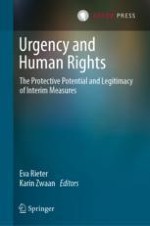2021 | OriginalPaper | Chapter
10. The Innovative Potential of Provisional Measures Resolutions for Detainee Rights in Latin America Through Dialogue Between the Inter-American Court and Other Courts
Authors : Clara Burbano Herrera, Yves Haeck
Published in: Urgency and Human Rights
Publisher: T.M.C. Asser Press
Activate our intelligent search to find suitable subject content or patents.
Select sections of text to find matching patents with Artificial Intelligence. powered by
Select sections of text to find additional relevant content using AI-assisted search. powered by
